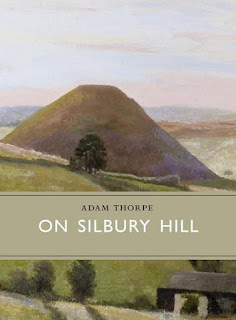This was a book I found in the wonderful Malvern Bookshop and, although I won't be reading it cover to cover, I will make a point of looking up every local place I visit. Why? Well a few examples will help but first let us see how it ended up in my house because it bears the evidence of having been a library book.
 The proprietor told me that she often bought up collections so closed-down libraries were a key source. She was such a book buff that she kept behind the counter a book full of lovely sketch illustrations of dogs, 'I will only sell it to someone who promises not to remove the pictures and sell them separately', she told me. I don't know what the staining is on the inside cover page of my book and will not be finding out.
The proprietor told me that she often bought up collections so closed-down libraries were a key source. She was such a book buff that she kept behind the counter a book full of lovely sketch illustrations of dogs, 'I will only sell it to someone who promises not to remove the pictures and sell them separately', she told me. I don't know what the staining is on the inside cover page of my book and will not be finding out.
The copy I have is a 1950 reprint. I don't know if you can, offhand, think of anything that made a substantial difference to the appearance of Warwickshire towns and cities between 1936 and 1950 but the author could. Then chose to ignore it. Which, to be fair, is what makes the text zing. Every visit to a Luftwaffe drop-zone with this text reminds you of what the place used to look like.
Let us head to Coventry. Or maybe the wonders of the clean air and dust-free buildings turn your thoughts to the Med? Did I say buildings? What buildings? It wasn't desirable to note that they are now missing.But I am a child of Selly Oak. (My mother now pipes up from the grave reminding us, because she was a dreadful snob about this sort of thing, that I came from Selly Park, not Selly Oak.) Whatever, I have to say I failed to notice that I was in '...one of the wonderful intellectual centres of England.' I had to walk half a mile into Edgbaston to get to one of the best schools in the country. And Selly Oak library warrants an illustration, although it is not of the building I remember which was black (from coal dust, probably), austere and next to a railway bridge.
The discussion of Selly Oak Colleges goes on the suggest that there is a possibility of a drinking vessel used at the last Supper being there. This interesting argument is slightly skewered by the inscription of the words of Jesus at that event on the goblet. Indiana Jones not heading our way.My late Aunty Brenda was fond of saying 'I'm just going up the village' when she left the house to go to Selly Oak. It strikes me as a folk memory from a time before Birmingham came out and swallowed it, moving on in pursuit of Northfield, Rednal and Rubery
Although my favourite hard-to-visualise is the comparison of Sutton Coldfield's Parade with the famous Richmond in Surrey. Famous for being on-Thames I recall. Sutton what are you like? You misplaced the river.
I will be returning for further volumes.







